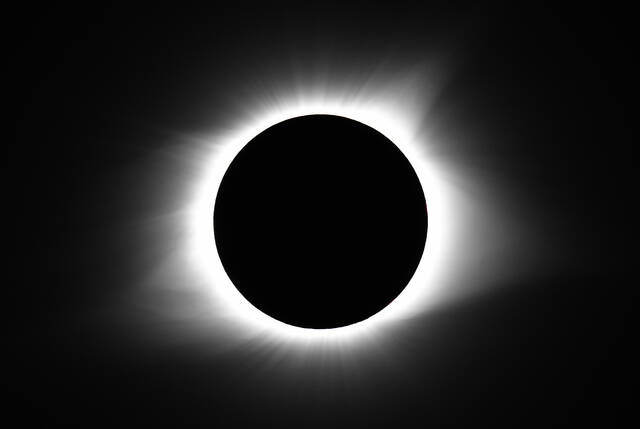If the sun went dark and day turned into night, would you yell loudly, throw away your meal, maybe search through your dresser for some red underwear?
In the past, people have followed those traditional measures to avoid or undo the bad luck they associated with a solar eclipse.
On April 8, modern eclipse chasers will travel long distances to be in position for the best view of the latest totality, when the moon passes directly between the Earth and the sun. However, throughout history, the celestial event has often been seen as a sign of misfortune or cause for panic.
NASA dispels a common myth that an eclipse will somehow emit harmful rays that can spoil food prepared during the event.
“If that were the case, the same radiations would harm the food in your pantry or crops in the field,” the space agency points out.
According to The Old Farmer’s Almanac, similar traditional beliefs have been documented in Japan, where people covered their wells to keep the water from being poisoned, and in
Alaska, where native inhabitants turned their dishes upside down and washed exposed utensils to prevent eclipse-infected dew from spreading illness.
Mexican traditions provide steps expectant mothers can take to prevent an eclipse from affecting their babies, as mentioned in a Texas Public Radio report.
Metal seems to be a crucial element in protecting the offspring. The pregnant woman is advised to wear a safety pin on her belly. If the eclipse happens after the baby is born, she can open a pair of scissors in the shape of a cross and place it under the crib.
For added protection, the mother-to-be can put on some red underwear, an idea that may be a remnant from an Aztec custom.
The Old Farmer’s Almanac points to a belief dating back to ancient times that an eclipse could afflict a newborn with blindness, a birthmark, or a cleft lip.
The Aztecs are believed to have thought an eclipse occurred when a creature in the sky bit into the sun, and that a baby would suffer a similar fate if the pregnant mother dared to watch what was happening in the sky — not to mention the woman’s risk of being blinded if she looked directly at the sun.
Eclipses are attributed to sun-swallowing villains in several other cultures. Norse mythology blames a large wolf associated with the trickster god Loki. A dragon does the dark deed in Armenia; a giant frog is the culprit in Vietnam.
In India, the sun is devoured by the demon spirit Rahu. Fortunately, since the demon’s head has been separated from his body for a prior offense, the sun is ensured to shine once again instead of being digested.
In some cultures — predating modern rock music — people would beat on drums and scream and shout to scare away whatever malevolent being had covered the sun.
As per the Exploratorium museum in San Francisco, members of the Choctaw tribe attributed eclipses to a mischievous squirrel gnawing on the sun.
A tale among the Cree is that a boy — or maybe a dwarf — is angered at being burned by the sun and seeks revenge by trapping it in a snare. A small mouse is the only animal capable of gnawing through the ropes and setting the sun back on its path.
The Chippewa responded to an eclipse by shooting flaming arrows into the sky in order to revive the sun.
In certain cultures, the sun and moon are seen as having different genders, and an eclipse symbolizes their romantic union. However, there are also negative interpretations, such as the unwanted advances of the male moon or the portrayal of the two celestial bodies as incestuous siblings.
The Navajo, like many others, view eclipses positively, considering them a time of renewal within a cosmic cycle. During such events, they traditionally sit quietly and respectfully inside their homes.
Bad omen from the sky
Throughout history, people have viewed solar eclipses as foretelling the downfall of political leaders, the spread of disease, enemy invasions, or other difficult times.
Despite months between the solar event and earthly circumstances, people have still found a connection between the two.
A Chinese historian wrote about a solar eclipse on Aug. 28, 360, stating: “Whenever an eclipse covers a small portion of the sun, the calamity it brings will be relatively small, but, when it covers a large portion of the sun, the consequences will be much more serious. … The next year, the emperor died.”
Referring to an eclipse on Feb. 24, 453, Gregory of Tours may have been talking about the raids of Attila the Hun when he wrote: “Even the sun appeared hideous, so that scarcely a third part of it gave light, I believe on account of such deeds of wickedness and the shedding of innocent blood.”
A total solar eclipse visible in England on March 16, 1485, was certainly poorly timed for the nation’s queen, Anne Neville, who died that day.
As noted on medievalwanderings.com, historians believe the queen likely died of tuberculosis. At the time, her demise under literal dark circumstances was seen as having a greater prophetic consequence for her husband, King Richard III, who was fatally wounded in the Battle of Bosworth on Aug. 22 of that year.
Predictions, peaceful outcome
For centuries, people have worked to predict the timing of eclipses — a science that has grown more precise over the years.
Mark Twain’s character in the 1889 novel “A Connecticut Yankee in King Arthur’s Court” uses his knowledge of an upcoming solar eclipse to convince onlookers that he possesses supernatural abilities.
A Shawnee religious leader known as “The Prophet” performed a similar feat in real life. Tenskwatawa is said to have accurately predicted a solar eclipse that occurred on June 16, 1806, in response to a challenge of his powers issued by future U.S. President William Henry Harrison, who was at the time governor of the Indiana Territory. Tenskwatawa, historians believe the queen likely died of tuberculosis. At the time, her death in literal darkness was seen as having a greater prophetic impact on her husband, King Richard III, who was fatally wounded in the Battle of Bosworth on Aug. 22 of that year. predicted a solar eclipse that occurred on June 16, 1806, answering a challenge of his powers issued by future U.S. President William Henry Harrison, who at the time was governor of the Indiana Territory.
On at least one occasion, an eclipse has been credited with inspiring the peaceful end of armed conflict.
Reported a century after the fact by Greek historian Herodotus, a solar eclipse on May 28, 585 B.C. is said to have surprised soldiers in combat who were engaged in battle for Lydia, which is now Turkey, and the Medes, an ancient Iranian people. As a result, the soldiers supposedly dropped their weapons.
A temporary stop to the fighting was declared, ultimately putting an end to a war that had been ongoing for over five years.



